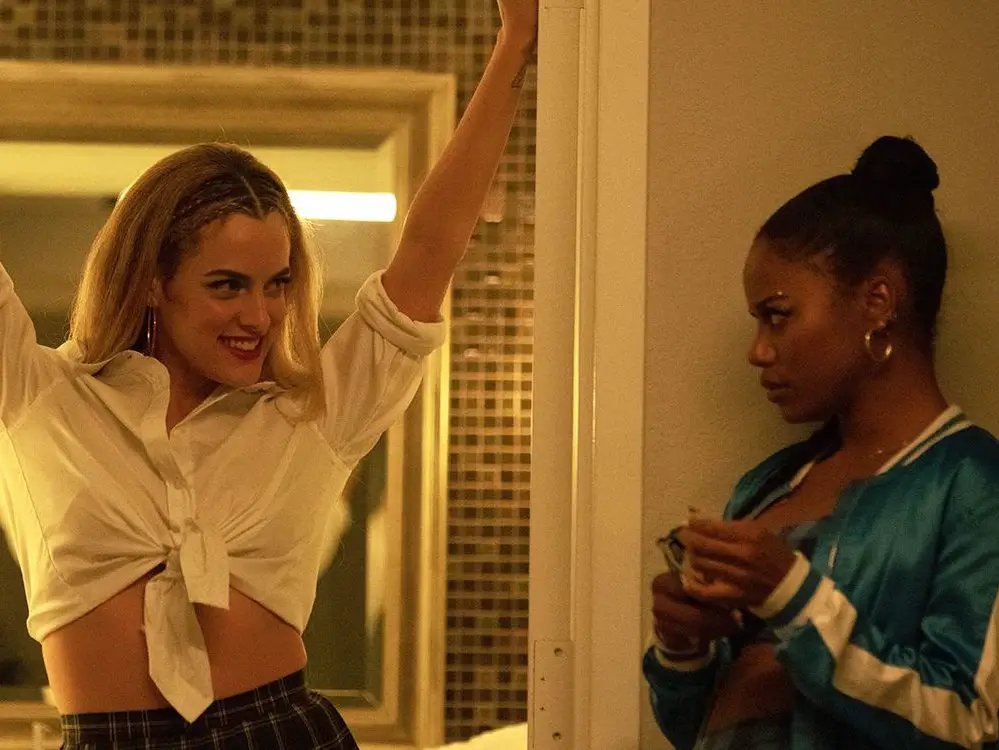The movie “Zola” breaks both filmmaking rules and viewers’ expectations through one simple but groundbreaking decision: to base an entire movie on a real-life Twitter thread. The result is a springing-forth of both creative risks and artistic flourishes.
The movie’s first scene exemplifies the movie’s unique perspective. “Zola” opens on two beautiful women applying colorful, gaudy makeup side by side. One woman is white, the other Black. The camera focuses in on the white woman, and a voice overlays the imagery — “Y’all wanna hear a story about why me and this bitch here fell out? It’s kind of long, but full of suspense.”
A chirping sound sandwiches the quote, alerting viewers that Zola’s words come straight from the real-life Twitter account where A’Ziah “Zola” King posted the tweet in 2015. Throughout the rest of the film, the tweeting sound recurs whenever actress Taylour Paige quotes King word-for-word.
In one of the film’s early scenes, an extra-friendly customer named Stefani with a syrupy Southern accent connects with Zola at work and asks if she wants to dance with her that night. Over the course of the evening, the two women become fast friends, grabbing food and talking into the early morning. “I feel seen, I feel heard,” Paige quotes King, as the scene unfolds.
Soon after, Stefani invites Zola to drive with her from Detroit to Tampa Bay, promising $5,000 in one night at a Florida strip club. Zola jumps at the opportunity and hops into a car with Stefani, her boyfriend, and a mysterious roommate. This is where things begin to get scary.
“From here on out, watch every move this bitch make,” Paige says. We do, and watch Stefani as she laughingly disparages a black woman about her “nappy,” and “dirty a–,” treats her “roommate” with unwarranted and confounding respect, and attempts to convince Zola that their bags are safe in their disgusting hotel room.
As Zola learns more and more about her carpool buddies, and as she begins to unravel Stefani’s thread of lies, the character realizes that her control over both her body and life is in danger, and finds herself walking a tightrope between pacifying her captor and protecting herself.
In one moment, the character complies with her captor’s exploitative demands, while in the next she draws the line. In these moments, Zola chooses her words with utter simplicity: “I’m done,” she says in a low voice, devoid of inflection.
These deadpan moments do not prevent Paige from instilling her role with the kind of reactions that keep “Zola” a dramedy, even when the plot screwballs to horror.
In one instance, for example, Zola stands facing the wall, her back to Stefani and the stranger she is having sex with on the bed. Zola ignores the couple — until she turns her head for a moment and registers the scene before her. In that instant, Paige’s eyes face the camera and convey laugh-out-loud disbelief and disgust: “It was gross,” she says over the scene.
The actress’s believable performance absorbs viewers completely, in part because her supporting cast keeps up the façade of reality and the audience on the edges of their seats. Colman Domingo plays a terrifying pimp with razor-sharp emotionality, while Riley Keough makes the feckless Stefani larger than life.
In an interview with Vanity Fair, King testifies to the efficacy of Keough’s performance. According to King, Keough mirrors her real-life inspiration. Describing Jessica, the woman who inspired Stefani, she recounts: “She was very animated in the way she spoke, dropping N-bombs and just very problematic. [Director Janicza] Bravo told Riley, ‘just go for it.’ And Riley took it there. She’s probably my favorite character in the film. She cracked me up… especially since I know the girl in real life. That is exactly how she acted.”
This acting, along with the movie’s uncanny, rule-breaking plot, is one of the reasons “Zola” strips viewers of their preconceptions and absorbs them in the narrative. As Rolling Stone observes, “It’s a movie about the hyper-present, glittering, wry, gleefully distasteful, disarming in how effectively it alienates Zola from this story she’s telling from herself.”
The film’s music upholds the impression of hyperreality. The score resounds with the modern, simplified notes one might find at a “zen” spa, except stripped down until they become tense and unnerving. When Zola sees her sketchy motel room for the first time, two young boys bounce a basketball on the balcony above her. The staccato drum-like bounces of the ball on the balcony bring out Zola’s all-too-real and all-too-present danger, forcing viewers into the moment.
Another way “Zola” surprises its viewers is its cinematography, as the camera chops characters into disparate, sexualized chunks like the literary blazon. Ironically, this cinematography also highlights the vulnerability and humanity of the characters, as their naked bodies — which are, of course, parts of themselves — are figuratively chopped up and dissected like meat. Viewers are left wondering: Can an industry that forces humans to treat each other like animals possibly be morally gray?
In this and other ways, “Zola” offers a nuanced take of sex work. After all, Zola herself is a stripper and addresses her occupation without shame. However, she disparages intimate sex work: “I am not here for that,” the actress quotes of King’s tweet.
“Zola” also provides a nuanced perspective of race and interpersonal dynamics. Though Zola bears dark skin and the dissembling Stefani is white, the relationship between the two characters, as well as between others in the film, shoves against the constraints of “good guy” and “bad guy.”
Though the film recounts a string of exploitations, the very telling of Zola’s story leverages King to greater wealth and influence. This position is made official, as King is listed in the credits of “Zola” as an executive producer, reversing, at least to some extent, the injustices that “Zola” recounts. This is especially satisfying because, though writers Bravo and Jeremy Harris changed some major details, they left the meat and the spirit of King’s tale untouched.
Perhaps this is because King’s own tweets tell a riveting, if unconventional, story, one that laymen and professional storytellers avidly followed. In 2015 for example, filmmaker Ava DuVernay tweeted the following of King’s thread: “Drama, humor, action, suspense, character development. She can write!”
That doesn’t mean that King’s tweets — or “Zola” itself, for that matter — follow a traditional story arc. As a result, the film alienates some viewers, while satisfying those willing to embrace the odd; for example, though Rolling Stone raves about the film, The New York Times does not. And the story is not without some conclusion: The very fact that Zola survives the nightmare with her dignity intact elicits deep breaths from viewers, along with a rush of catharsis.
The audience doesn’t know what will become of the movie’s cast, none of whom fit cleanly into the role of hero or villain, nor really anywhere in between. However, viewers do understand that the world, for Zola and ourselves, is crazy, and that those who navigate it with grace have a much better shot of driving away alive.
















